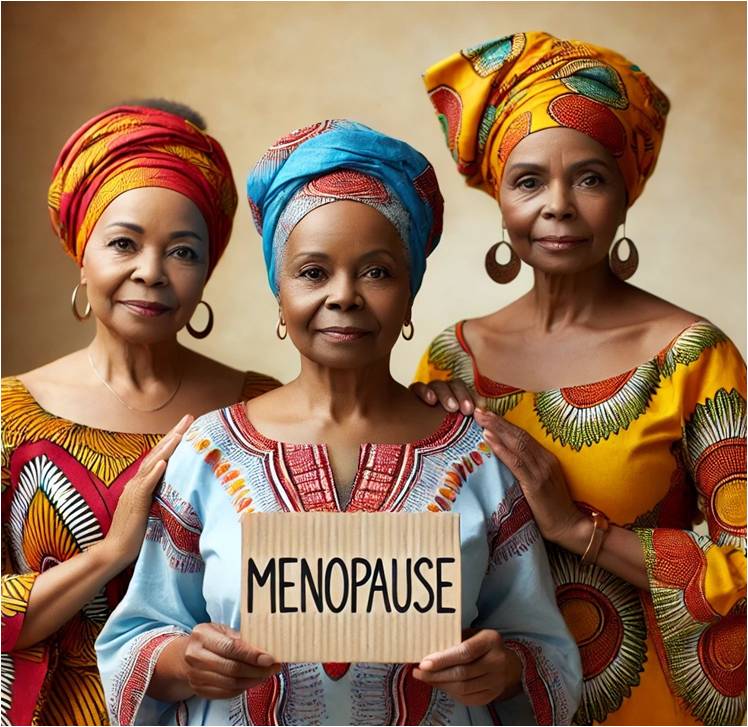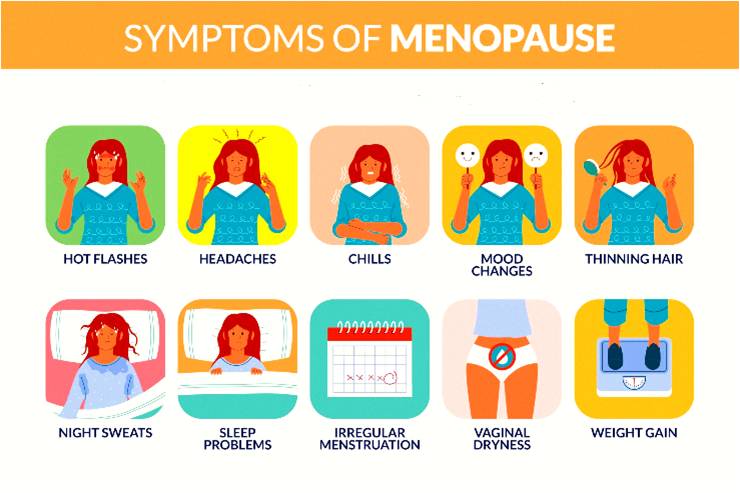Menopause: Basic Information for Africans
By: Foluke Akinwalere. Freelance Health Writer. Medical review and editorial support provided by the T.N Mungchieng MD and O Oni, MD

AI generated image of three African women of menopausal age posed standing in colourful attire with middle one holding a menopause sign.
Menopause is a significant milestone in every woman’s life. It is a natural phase that signals the end of childbearing years, and brings a mix of physical, emotional, and social changes in a woman’s life.
In Africa, menopause is frequently misinterpreted, surrounded by myths, and sometimes viewed through cultural lenses. That is why many African women find it difficult to discuss menopause openly due to the cultural beliefs and societal expectations. The subject matter is covered in silence and misunderstanding, leading to confusion, fear, or feeling of isolation.
Menopause is not a disease or a sign of failure as regarded by many African communities. It is a transition phase just like getting into the adolescence, adulthood, or motherhood phase. Understanding this natural phase of life is crucial for African women to manage it confidently and live healthily.
This article provides detailed information on menopause, including its phases, types, symptoms, associated health disorders, common myths in Africa, and answers to frequently asked questions.
Menopause is a natural process that occurs when a woman permanently stops having menstrual periods, marking the end of her ability to have children. It happens because the ovaries stop producing as much estrogen and progesterone, the hormones that control menstruation. It usually occurs between ages 45 and 55 and is confirmed after 12 months without a menstrual period.
Menopause occurs in different phases. To better understand menopause, you need to understand the different phases as shown in Figure 1 below:
Fig. 1: showing infographic representation of the phases of menopause. Click on image to enlarge.
2. PERIMENOPAUSE
3. MENOPAUSE
4. POSTMENOPAUSE
Factors that influence the timing include:
This occurs gradually as a woman ages and her ovaries stop producing eggs causing her estrogen and progesterone levels to reduce. This happens between ages 45 and 55
This is when menopause occurs before the expected age range. Premature menopause happens before the age of 40 while early menopause occurs between age 40 and 45. Both may be caused by genetic factors , autoimmune diseases, lifestyle factors (like smoking) or medical conditions.
This is a menopause caused by a medical procedure. This happens when a woman undergoes surgery to remove both ovaries (Oophorectomy), or as a result of medical treatment like chemotherapy, radiation, or medications that suppress the functions of the ovaries. Both lead to a sudden drop in hormone levels and immediate menopause symptoms.
For many African women, understanding this biology of menopause can feel overwhelming or even unnecessary, especially when cultural beliefs often link this stage of life to myths or spiritual interpretations. But menopause is simply a natural process, determined by the body’s hormonal changes.
Throughout a woman’s life, her body works like a well-coordinated team, with hormones like estrogen and progesterone controlling her reproductive cycle. During her reproductive years, the ovaries release an egg each month, making it available to be fertilized by sperm for the possibility of pregnancy. This process is called ovulation. [2] If the egg is not fertilised, it causes her monthly menstrual period.
As a woman ages, the ovaries naturally slow down her activity. This is not a failure or a problem—it’s part of the body’s design. The number of eggs in the ovaries reduces over time, and so does the production of estrogen. This hormonal shift is what eventually brings an end to monthly periods and marks the transition into menopause.
Learn more about Ovulation here
It’s important to remember that menopause doesn’t happen overnight. The body gives signs as it prepares for this transition, though they can be easily missed or misunderstood.

Recognising the signs of menopause can be confusing. Often, the changes begin gradually and may be dismissed as stress, aging, or even in cultural mythical terms. Some women are hesitant to speak about their symptoms because they fear judgment or misunderstanding, but knowing what to expect can help ease the transition and empower you to seek the right support.
The first signs of menopause often appear during perimenopause. These changes may feel unfamiliar and even worrisome especially if no one around you talks openly about them.
Here are some early signs: (See also figure 2)
Once you’ve gone 12 months consecutive without a menstrual period, you have officially entered menopause. [1] By this point, some symptoms may become more persistent or noticeable:
For many African women, these symptoms are dismissed as “normal aging” or even spiritual afflictions. Recognising these changes as part of a natural biological process is key to seeking support.
The changes that come with menopause can increase the risk of certain health conditions (see figure 3):
Fig 3: Health effects of menopause
Osteoporosis is a condition marked by changes in bone structure and strength, resulting in decreased bone strength and an increased risk of fractures. In women, osteoporosis can be caused by hormonal changes, such as low estrogen levels after menopause, absence of menstrual periods in premenopausal women. [3] Adding calcium-rich foods like milk, fish, and green vegetables into your diet can help to strengthen bones, slow bone loss, and reduce the risk of fractures.
Lower estrogen levels can increase the level of bad cholesterol and the risk of heart disease. Regular physical activity and heart-healthy foods such as beans, nuts, and fruit can help to reduce the risk.
Hormonal changes can lead to weight gain, especially around the abdomen. A balanced diet and exercise are essential to manage these changes.
Feelings of anxiety, depression, or isolation are common during menopause. In African communities, where mental health discussions are still stigmatised, women may hesitate to speak up.
During menopause, the vaginal, bladder, and urethral valves tissues may lose elasticity, which can result in sudden, strong urges to urinate or even involuntary leakage. Simple actions like coughing, laughing, or lifting may also lead to urine leakage, which potentially increases the risk of urinary tract infections. Seeking medical advice can help manage these symptoms.
The symptoms of menopause can be overwhelming for some women. And this may interfere with their daily life, emotional well-being, and overall health. Knowing when to seek support is crucial in ensuring you remain healthy, comfortable, and empowered during this phase.
While mild symptoms like occasional hot flashes, or mood swings are common and manageable, certain signs may indicate the need for professional help:
If your periods become extremely heavy, last more than a week, or occur unusually close together, it could signal underlying health issues such as fibroids, hormonal imbalances, or other conditions. These require prompt medical evaluation.
Any unusual vaginal bleeding after a year without a period is considered “postmenopausal bleeding” and should be investigated by a healthcare professional.
When hot flashes become so intense that they disrupt your sleep or make it difficult to function during the day, seeking support can help. Hormonal therapy or alternative treatments may provide relief.
If feelings of sadness, irritability, or anxiety become overwhelming or persistent, it may not just be “a phase”. Depression and anxiety can intensify during menopause, particularly for women who feel isolated or unsupported in their communities.
Vaginal dryness, itching, or discomfort during intimacy is common but often unspoken due to cultural sensitivities. If these symptoms affect your quality of life or relationships, don’t hesitate to consult a healthcare provider for options like lubricants, moisturisers, or estrogen creams.
Persistent pain or frequent fractures should prompt you to see a doctor for preventive care, like bone density tests or calcium and vitamin D supplementation.
Rapid weight gain, especially around the abdomen, or an inability to manage weight despite healthy eating and exercise, could indicate metabolic changes. A healthcare provider can guide you on diet, exercise, and possible medical interventions.
Hormonal shifts during menopause can sometimes mimic heart-related symptoms. Any unusual chest discomfort, shortness of breath, or irregular heartbeat should be addressed immediately, as they could indicate cardiovascular concerns.
While menopause can cause tiredness, extreme or persistent fatigue that leaves you feeling unable to carry out daily tasks might signal underlying conditions like anaemia, thyroid issues, or depression.
Menopause is a natural part of life that brings changes and challenges, but with knowledge and preparation, it can be a manageable and even empowering phase. Understanding menopause’s symptoms, health risks, and myths can help African women navigate this transition confidently.
1. World Health Organisation (WHO), Menopause, [Internet] 16 October, 2024. Accessed: January 21, 2025. Available from here.
2. Obialor B. How To Determine Your Fertile Window For Pregnancy: A Guide For African Women. [Internet]. May 06, 2024. Datelinehealth Africa Inc. (Accessed: January 22, 2025) Available from here.
3. Onyenekwe V. 10 Common Hormone-Linked Disorder in African Women. [Internet]. September 19, 2024. Datelinehealth Africa Inc. Accessed January 23, 2025. Available from here
Published: February 7, 2025
© 2025. Datelinehealth Africa Inc. All rights reserved.
Permission is given to copy, use and share content freely for non-commercial purposes without alteration or modification and subject to source attribution.
DATELINEHEALTH AFRICA INC., is a digital publisher for informational and educational purposes and does not offer personal medical care and advice. If you have a medical problem needing routine or emergency attention, call your doctor or local emergency services immediately, or visit the nearest emergency room or the nearest hospital. You should consult your professional healthcare provider before starting any nutrition, diet, exercise, fitness, medical or wellness program mentioned or referenced in the DatelinehealthAfrica website. Click here for more disclaimer notice.